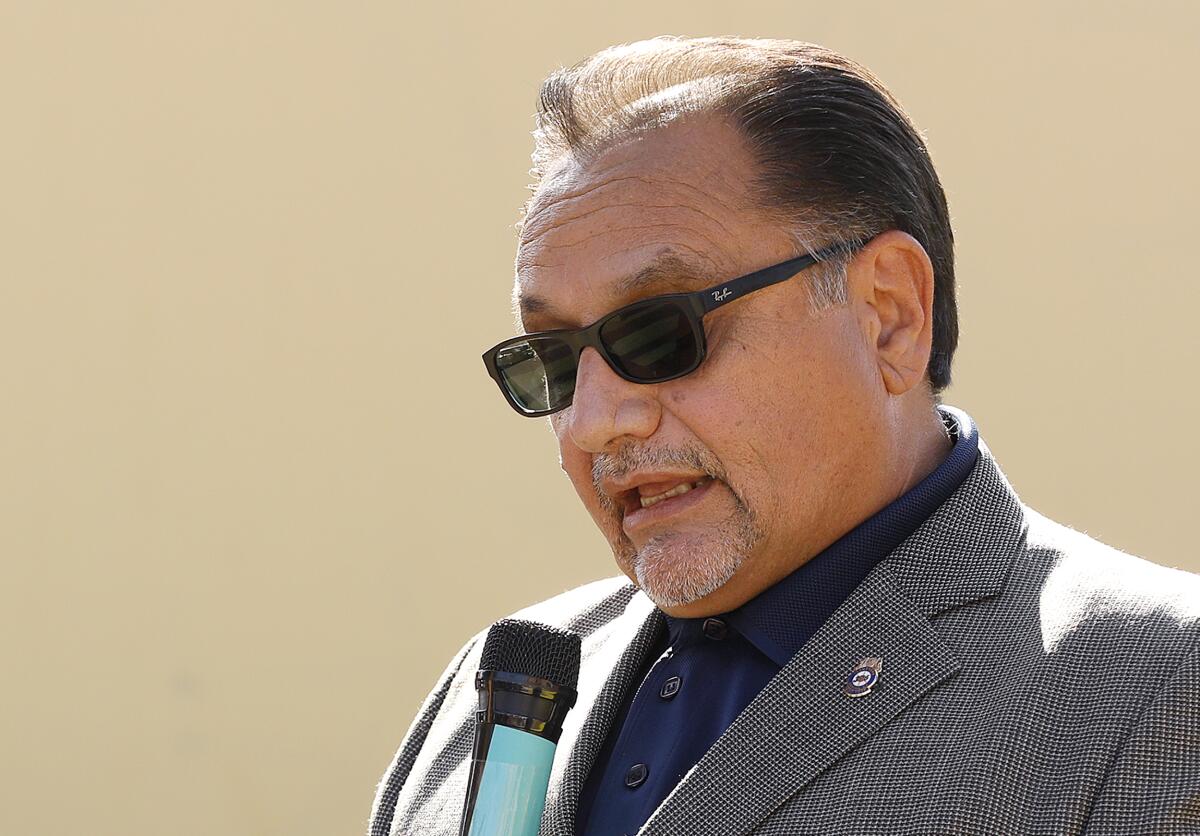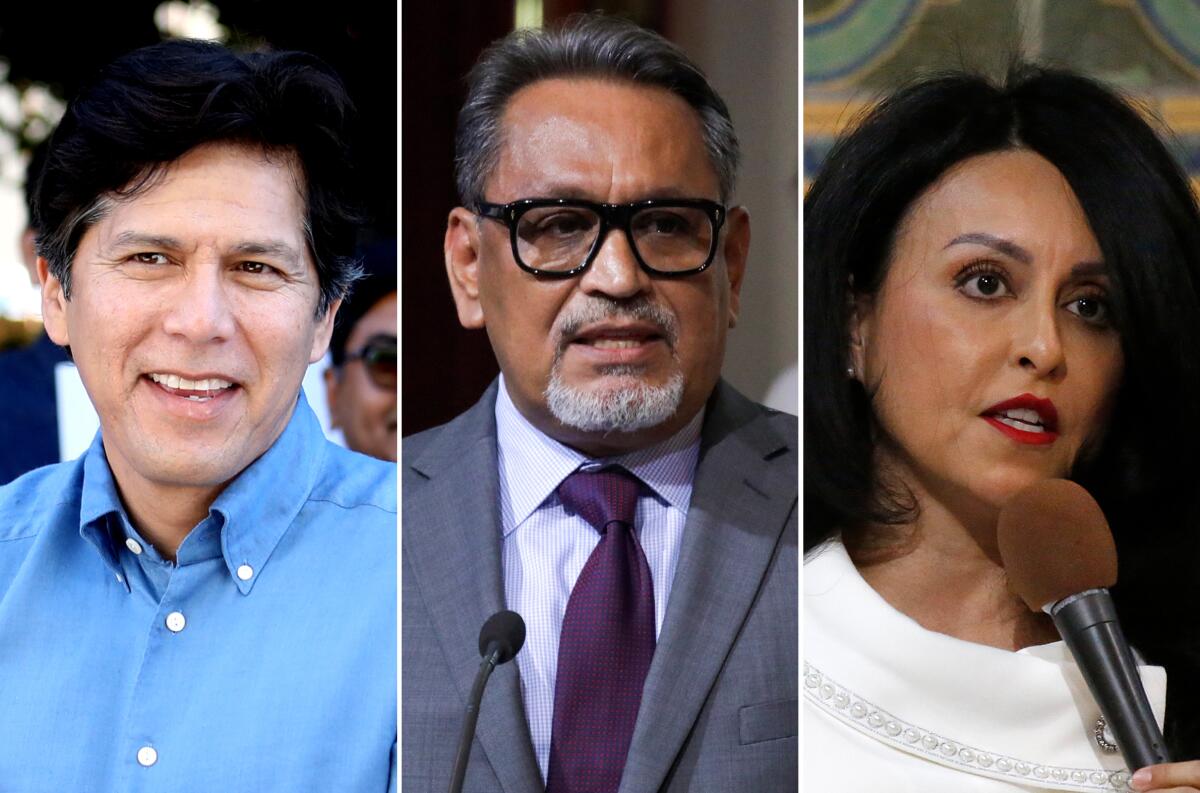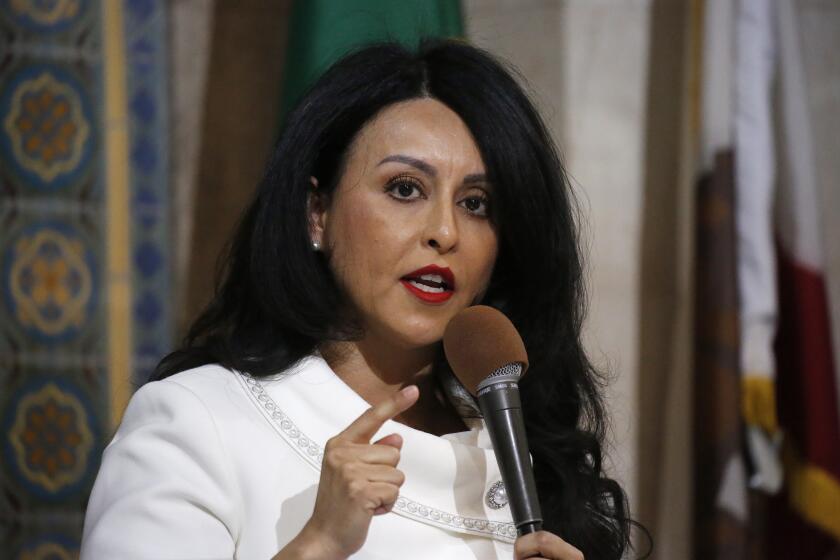Column: Racist L.A. audio leak shakes the foundation of labor unions: ‘I felt betrayed’

The day before he crashed headlong into disgrace via the racist mess currently upending Los Angeles politics, former labor leader Ron Herrera was out stumping for Black candidates, including Karen Bass — speaking about the need for unity among communities of color.
Which is why Lola Smallwood Cuevas, running for state Senate and one of those Herrera was helping, felt the blade of treachery when she heard the recording secretly made inside the Los Angeles County Federation of Labor.
Beyond the blatant racist remarks caught on record, Herrera’s conniving to elect Latino politicians while suppressing Black voting power was both a personal strike, she said, and one against the House of Labor from a Judas in their midst.
During an October 2021 conversation with L.A. Councilmembers Gil Cedillo and Kevin de León and L.A.
“It really hurt,” she told me. “I felt betrayed.”
April Verrett had a nearly identical reaction when she heard Herrera talking with three Latino politicians — Nury Martinez, Gil Cedillo and Kevin de León — a conversation that included Herrera telling them that his “goal in life” was to help them win elections because, together, the group was “like a little Latino caucus of our own.”
“I’m 48 years old, and I’ve been a Black woman all my life, obviously, and the sh— still hurts,” she told me. She heads up Service Employees International Union 2015, with more than 200,000 members in the Los Angeles area — mostly Black, Latino and Asian Pacific Islander women.
“I keep going back to the purpose of why they were in that room. It was essentially to talk about diminishing and stepping on Black voices, Black power, Black influence in the city for their own gain,” Verrett said. “But as I unpacked it, the hurt was magnified for me, because Ron was in that room. And not just him in that room, but because this conversation was being had in the House of Labor.”

The recording’s political fallout pulled even President Biden into the conversation. It led Herrera to resign earlier this week and Martinez to step down from the City Council on Wednesday.
But the fact that a labor leader was involved has shaken unions and union members in Los Angeles and across the country. In a movement that promises equity and equality, and where the fundamental power lies in fellowship, trust has been shattered into pieces that won’t easily fit back together.
The phrase “House of Labor” doesn’t mean much to anyone who hasn’t spent time working in unions, but it’s a foundational idea for those who see the labor movement as a way of life. The House of Labor is an ideal: that organizing workers is more than a job or even a cause.
It’s the indivisibility that protects the vulnerable, elusive hope we call the American dream — a place where the car washers, janitors, home healthcare aids, teachers and, well, everyone has the right to a life of dignity.
Organized labor, for those in the house, is a ride-or-die quest dependent on the ability to stick together.
Now many of those personally injured by Herrera’s actions, such as Verrett and Smallwood-Cuevas, are left to rebuild that house in L.A. and to convince others that what happened in that room isn’t the norm for organized labor — though, to be honest, some fear that it is.
“The whole country is watching,” Verrett said.
And it is watching just as the election season builds to a culmination — when unions traditionally are the boots on the ground rounding up votes and when new workers are looking to join unions after decades of stagnation for labor.
Herrera’s home union, the Teamsters, is helping Amazon warehouse workers organize. How do you ask potential members to believe the union has their best interests at heart when backstabbing is on full display? The state attorney general is conducting a civil rights investigation into the redistricting process, so that question could become even more fraught.
“With a scandal this bad, with the L.A. Federation of Labor being involved, it could really do some long-term damage,” Chris Zepeda-Millán, chair of Labor Studies at UCLA, told me.
Herrera, not unexpectedly, didn’t return my call or text.
Of course, unions haven’t always been fair to Black workers, even during the civil rights movement, when they were deeply intertwined with that righteous cause.
As far back as 1913, Booker T. Washington, living in an era when many unions admitted only white workers, asked, “Shall the labor unions use their influence to deprive the Black man of his opportunity to labor?” Or will labor unions use their power “to lessen rather than to magnify the prejudices which make it difficult for white men and Black men to unite for their common good?”
The answer has always been mixed, and complicated — especially in a diverse city such as Los Angeles. And especially as the Latino majority has grown inside the House of Labor and in society — as my colleagues Gustavo Arellano and Erika D. Smith have written about so poignantly this week.
But organized labor is one of the most powerful political players in California and the country, and the Los Angeles County Federation of Labor is its heartbeat on the West Coast, representing 800,000 workers. Kent Wong, director of the UCLA Labor Center, calls it a “major force” in state politics.
So what happens inside its house should matter to everyone.
And what happened in a room inside the drab, two-story building on a side street in Pico-Union has revealed another division in the House of Labor beyond race, beyond Los Angeles and, really, beyond unions.
Labor is struggling to meld with increasingly progressive members, further left than the old guard of liberals, who for decades have pushed an incremental-change, wait-your-turn philosophy. This new progressive front is less patient — urged on by a climate crisis, income inequality and other issues that demand action — and multiracial in its vision of power. Its members want more and faster transformation not just in workplaces but also in social equity fights.
That’s exactly where you think labor, and California, would want to be and often is: Look at the fights to raise the minimum wage or to win rights for fast-food workers, who are predominately people of color.
But Herrera showed publicly what some inside the House of Labor have contended for a long time: Much of labor isn’t progressive.
The schism is a split between Democrats that is mirrored in the state Capitol, where progressives are continually trying to push their liberal-but-not-quite-that-much counterparts further left. The moderate Democrats, a small group that is more centrist, are becoming irrelevant, so great is the pull away from the middle.
If I crystal-ball what the future holds for the L.A. fed, it’s not a wild prediction to say that its next leader will be a progressive. There has even been speculation — though few facts, at this point — that it could have been a frustrated progressive staffer inside the federation who made the recording in a bid to force change. If that proves true, my personal thanks to our whistleblower for cleaning house, even if you used a bomb to do it.
If the federation does shift to become more progressive, it’s likely California politics will, too — meaning this ugly conversation could become a catalyst of change for the state, not just for the L.A. City Council.
But first, the foundation of the House of Labor has to be repaired, patched up, glued together, stomped on a few times to make sure it holds. No easy task.
“Turning on each other is not the answer,” said Smallwood Cuevas, and I agree with her — but the damage Herrera caused is visceral. And with that kind of pain, you can only go through it, not around it.
Smallwood Cuevas is married to a Mexican American from Boyle Heights, and her kids identify as Blaxican. Hers is a family, she said, that refuses to pick one identity over the other. It is also a labor family — she founded the Los Angeles Black Worker Center at the UCLA Labor Center and once was a community organizer for SEIU.
She couldn’t sleep thinking about the difference between what was on the recording and what Herrera speechified about at her fundraiser with the Black Women’s Democratic Club — his talk of solidarity. Like so many in the labor movement I spoke with, she thought Herrera was an ally, a fighter who shared her values, when in reality, she said, he was scheming in a “Jim Crow, 1910” way.
“How do you hold these two experiences up against each other and try to make sense of it?” Smallwood Cuevas wondered, still figuring it out. “The House of Labor is a house of justice. And that conversation was a threat to justice.”
Not just a threat, a blow — one that leaves a scar.












